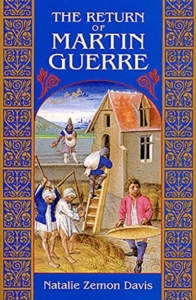The Return of Martin Guerre
 By Natalie Zemon Davies
By Natalie Zemon Davies
Review by Ella (History)
Before applying to university, I knew that History was my favourite subject but was daunted by the amount of reading that a history degree would entail. The Return of Martin Guerre was one of the first texts I embarked upon that I genuinely enjoyed every page of and did much to convince me that I really wanted to study History further.
The book tells an incredible story, engagingly written, meaningful, and short. In it, Zemon Davies traces the life of the sixteenth-century peasant Arnaud du Tilh, who successfully pretended to be Martin Guerre for c.3 years before being taken to court for identity theft. It reassured me that histories of more ordinary people could be reconstructed in great detail, despite the elite biases of source material. Ultimately, it allowed me to better engage with the types of history books that I had previously found so impenetrable.
In addition to being really interesting in its own right, “The Return of Martin Guerre” really helped me to move my application beyond typically content-based A-Level work by getting me to consider different ways of doing history. The book is a classic example of micro-history, focussing on something very small (i.e: the life of one peasant) yet suggesting much about sixteenth-century society more generally, such as the way that its legal systems operated or how its gender roles functioned. Micro-history was not something I had ever encountered before but engagement with different types of history has proved very useful at university where you are encouraged to think about how history is written, why different approaches are adopted, and what these different methods can tell us about the past.
Moreover, because these events were so exceptional, they have been retold multiple times, helping you to think critically about each version by comparing them. Indeed, it was Zemon Davies’ dissatisfaction with the account offered by an earlier French film, directed by Daniel Vigne, that inspired her to write the book. Also, if you are lucky enough to have access to Jstor (or if you set up a free account that allows you six free articles), there are a number of review articles that can help you to challenge Zemon Davies’ interpretation. Robert Finlay’s (sometimes quite scathing) review is excellent in this regard, pointing out the extent to which Zemon Davies puts her own stamp on the source material and questioning whether she has allowed her modern-day values too much influence.
Overall, this is a highly enjoyable and accessible read, yet one that raises many serious historical debates.
The Return of Martin Guerre by Natalie Zemon Davies
ISBN-10: 0674766911
ISBN-13: 978-0674766914
Try checking the availability of this book at your school or local library or explore second hand bookshops and websites. You may also wish to purchase from either Amazon or Blackwell’s.
